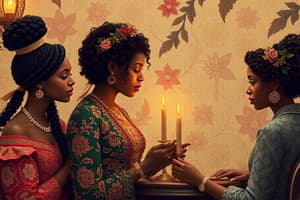Podcast
Questions and Answers
What did Wilhelmina Griffin Jones's friend do during their interaction with the police once they were pulled over?
What did Wilhelmina Griffin Jones's friend do during their interaction with the police once they were pulled over?
- He subtly adjusted his clothing during the encounter.
- He disrespected the police officer.
- He convincingly lied to the police officer.
- He shifted his personality to seem friendly. (correct)
What complaint did the police officer have against Wilhelmina Griffin Jones during the roadblock?
What complaint did the police officer have against Wilhelmina Griffin Jones during the roadblock?
- Her refusal to comply with his orders.
- Her use of the term 'Miss' to describe herself. (correct)
- The speed at which she was driving.
- Her aggressive behavior during the encounter.
What was the reason for the police officer's lenient approach towards Griffin Jones friend?
What was the reason for the police officer's lenient approach towards Griffin Jones friend?
- His apparent wealth and social status.
- His previous relationship with the police department.
- His request for leniency on behalf of Jones.
- His non-threatening appearance and clothing and servility. (correct)
What stereotype was commonly used to justify the lynching of black men in the South?
What stereotype was commonly used to justify the lynching of black men in the South?
What racial stereotype was used to depict black women during slavery?
What racial stereotype was used to depict black women during slavery?
How did Ferdie Walker experience racism during her childhood?
How did Ferdie Walker experience racism during her childhood?
What impact did Ferdie Walker's experiences with the police have on her later life?
What impact did Ferdie Walker's experiences with the police have on her later life?
What strategy did Wilhelmina Griffin Jones' companion use to deal with public officials?
What strategy did Wilhelmina Griffin Jones' companion use to deal with public officials?
Flashcards are hidden until you start studying
Study Notes
Bitter Truths
- Ferdie Walker and Wilhelmina Griffin Jones both experienced racism and discrimination during their lives.
- Walker was sexually harassed by white police officers as a child.
- Walker's experience led to a lifelong fear of the police.
- Jones was harassed by a police officer and later by the mayor, both of whom used racist language and stereotypes.
- The officer stopped Jones and her friends due to a fire hose stretched across the street.
- The officer demanded Jones' name and berated her for addressing herself as “Miss” because she was not married.
- Jones was fined $17 for this.
- The mayor openly made racist remarks against Jones.
- Jones' friend wore overalls and tried to act friendly to the police to avoid confrontation.
- Jones was disturbed by her friend's actions, which demonstrated the "veiled compliance" of many Black Americans during Jim Crow.
- Both Walker and Jones' experiences highlight the impact of racist stereotypes on the lives of Black Americans, and the pervasive fear and humiliation they experienced.
- Walker and Jones' experiences demonstrated the resistance and political struggles Black Americans faced under Jim Crow.
Key Facts
- The stereotypes surrounding Black men used to justify lynchings, which were not usually related to the charge of rape, but were used to maintain white supremacy.
- The stereotypes surrounding Black women often described them as lustful and sexually available.
- These racist stereotypes were used to justify the sexual exploitation of Black women, particularly during slavery.
Studying That Suits You
Use AI to generate personalized quizzes and flashcards to suit your learning preferences.




